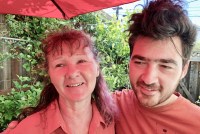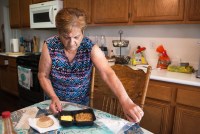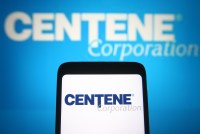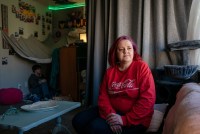Latest Morning Briefing Stories
Despite a First-Ever ‘Right-to-Repair’ Law, There’s No Easy Fix for Wheelchair Users
Colorado lawmakers approved a measure that will make it easier for people to fix their power wheelchairs when they wear out or break down, but arcane regulations and manufacturers create high hurdles for nationwide reform.
Computer Glitches and Human Error Still Causing Insurance Headaches for Californians
Covered California and Medi-Cal share a computer system for eligibility and enrollment. Nearly a decade since the Affordable Care Act expanded coverage options in the state, enrollees can be diverted to the wrong program — or dropped altogether — if erroneous information gets into the system.
Tacos y pollo al curry: Medi-Cal ofrece comidas preparadas en un experimento de atención médica
El programa ayuda a personas con diabetes y otras afecciones a comer más sano y a aprender sobre alimentos saludables. Busca mejorar la salud y reducir costos en atención médica.
Taco Bowls and Chicken Curry: Medi-Cal Delivers Ready Meals in Grand Health Care Experiment
California has embarked on an ambitious five-year initiative to improve the health of its sickest Medicaid patients by introducing nontraditional services. In the Inland Empire, where many residents have diabetes, one health plan is diving into the experiment by delivering healthy, prepared meals to those lucky enough to get them.
Montana Hires a Medicaid Director With a Managed-Care Past
Montana, one of about a dozen states still managing its own Medicaid programs, has a new Medicaid director who championed handing the management of the program to private companies in Iowa and Kansas.
KHN’s ‘What the Health?’: Waking Up to Baby Formula Shortage
The nationwide shortage of baby formula, which has been simmering for months, finally burst into public consciousness as more parents become less able to find food for their babies, prompting a belated federal response. Meanwhile, covid-19 cases rise but prevention activities don’t, and abortion-rights backers ready their legal arsenal for a post-Roe world. Alice Miranda Ollstein of Politico, Tami Luhby of CNN, and Rachel Cohrs of Stat join KHN’s Julie Rovner to discuss these issues and more. Plus, for extra credit, the panelists suggest their favorite health policy stories of the week they think you should read, too.
New Covered California Leader Urges Renewal of Enhanced Federal Aid for Health Premiums
Jessica Altman took over in March as executive director of California’s health insurance marketplace, which serves 1.8 million people. She warns that if Congress does not renew the tax credit enhancements that have made health plans more affordable, consumers will face significantly higher premiums, which could cause many to forgo coverage.
Medicare Surprise: Drug Plan Prices Touted During Open Enrollment Can Rise Within a Month
Even the savviest Medicare drug plan shoppers can get a shock when they fill prescriptions: That great deal on medications is no bargain after prices go up.
KHN’s ‘What the Health?’: More Covid Complications for Congress
Congress is back in session, but covid diagnoses for Vice President Kamala Harris and two Democratic senators have temporarily left the Senate without a working majority to approve continued covid funding. Meanwhile, opponents of the Affordable Care Act have filed yet another lawsuit challenging a portion of the law, and we say goodbye to the late Sen. Orrin Hatch of Utah, who left a long legacy of health laws. Rachel Cohrs of STAT News, Anna Edney of Bloomberg News, and Rebecca Adams of KHN join KHN’s Julie Rovner to discuss these issues and more.
Despite Losing Federal Money, California Is Still Testing Uninsured Residents for Covid — For Now
Federal funding that paid for covid testing, treatment, and vaccines for uninsured people has run out. While some states struggle to make up the difference, California is relying on other state and local programs to continue free testing.
Battle Lines Are Drawn Over California Deal With Kaiser Permanente
A controversial proposal to grant HMO giant Kaiser Permanente a no-bid statewide Medicaid contract is headed for its first legislative hearing amid vocal opposition from a coalition of counties, competing health plans, community clinics, and a national health care labor union.
Readers and Tweeters Sound Alarm Over Nurse’s Homicide Trial
KHN gives readers a chance to comment on a recent batch of stories.
KHN’s ‘What the Health?’: News You Might Have Missed
Congress is in recess, so the slower-than-average news week gives us a chance to catch up on underreported topics, like Medicare’s coverage decision for the controversial Alzheimer’s disease drug Aduhelm and ominous new statistics on drug overdose deaths and sexually transmitted diseases. Margot Sanger-Katz of The New York Times, Joanne Kenen of Politico and the Johns Hopkins Bloomberg School of Public Health, and Alice Miranda Ollstein of Politico join KHN’s Julie Rovner to discuss these issues and more. Plus, for extra credit, the panelists recommend their favorite health policy stories of the week they think you should read, too.
Who Doesn’t Text in 2022? Most State Medicaid Programs
As states prepare for the end of the covid public health emergency, they are making plans to reevaluate each Medicaid enrollee’s eligibility. They will rely primarily on mail and email because not many states can text enrollees.
California Handed Its Medicaid Drug Program to One Company. Then Came a Corporate Takeover.
The company awarded the state’s Medi-Cal Rx contract was taken over by another company, Centene. That left the state with a contractor it didn’t pick — one that has been accused of overbilling nine other state Medicaid programs and is now under investigation by California.
The End of the Covid Emergency Could Mean a Huge Loss of Health Insurance
It is a perilous time to throw low- and middle-income Americans off the insurance cliff: A new omicron subvariant is spreading, and a program that provided coronavirus testing and covid-19 treatment at no cost to the uninsured has expired.
ACA Sign-Ups for Low-Income People Roll Out Amid Brokers’ Concerns About Losing Their Cut
The Biden administration unveiled a new special enrollment option aimed at signing up low-income Americans for Affordable Care Act coverage — even if it is outside of the usual annual open enrollment period. But insurers are cutting broker commissions at the same time.
Patients’ Perilous Months-Long Waiting for Medicaid Coverage Is a Sign of What’s to Come
The pandemic crisis has overwhelmed understaffed state Medicaid agencies, already delaying access to the insurance program in Missouri. As the public health emergency ends, low-income people nationwide could find it even harder to have coverage.
Journalists Discuss How Legislation Affects Mental Health Care and Abortion Training
KHN and California Healthline staff made the rounds on national and local media this week to discuss their stories. Here’s a collection of their appearances.
KHN’s ‘What the Health?’: Funding for the Next Pandemic
In his proposed budget, President Joe Biden called for a boost in health spending that includes billions of dollars to prepare for a future pandemic. But that doesn’t include money he says is needed immediately for testing and treating covid-19. Also this week, federal regulators authorized a second booster shot for people 50 and older yet gave little guidance to consumers about who needs the shot and when. Amy Goldstein of The Washington Post, Jennifer Haberkorn of the Los Angeles Times, and Rachana Pradhan of KHN join KHN’s Mary Agnes Carey to discuss these issues and more. Plus, Julie Rovner interviews KHN’s Julie Appleby, who reported and wrote the latest KHN-NPR “Bill of the Month” episode about a very expensive air ambulance ride.






















